In this May 27, 2015 photo, former Moldovan police investigator Constantin Malic pauses during an interview in Chisinau, Moldova. In 2009, Malic was a 27-year-old police officer when he first stumbled upon the nuclear black market. He was working on a fraud unit in the Moldovan capital, and had an informant helping police take down a euro counterfeiting ring stretching from the Black Sea to Naples, Italy. The informant, a businessman in his fifties, casually mentioned to Malic that over the years, contacts had periodically offered him radioactive material. (AP Photo/Vadim Ghirda)
The Associated Press
CHISINAU, Moldova (AP) - In the backwaters of Eastern Europe, authorities working with the FBI have interrupted four attempts in the past five years by gangs with suspected Russian connections that sought to sell radioactive material to Middle Eastern extremists, The Associated Press has learned. The latest known case came in February this year, when a smuggler offered a huge cache of deadly cesium - enough to contaminate several city blocks - and specifically sought a buyer from the Islamic State group.
Criminal organizations, some with ties to the Russian KGB's successor agency, are driving a thriving black market in nuclear materials in the tiny and impoverished Eastern European country of Moldova, investigators say. The successful busts, however, were undercut by striking shortcomings: Kingpins got away, and those arrested evaded long prison sentences, sometimes quickly returning to nuclear smuggling, AP found.
Moldovan police and judicial authorities shared investigative case files with the AP in an effort to spotlight how dangerous the nuclear black market has become. They say the breakdown in cooperation between Russia and the West means that it has become much harder to know whether smugglers are finding ways to move parts of Russia's vast store of radioactive materials - an unknown quantity of which has leached into the black market.
"We can expect more of these cases," said Constantin Malic, a Moldovan police officer who investigated all four cases. "As long as the smugglers think they can make big money without getting caught, they will keep doing it."
In wiretaps, videotaped arrests, photographs of bomb-grade material, documents and interviews, AP found a troubling vulnerability in the anti-smuggling strategy. From the first known Moldovan case in 2010 to the most recent one in February, a pattern has emerged: Authorities pounce on suspects in the early stages of a deal, giving the ringleaders a chance to escape with their nuclear contraband - an indication that the threat from the nuclear black market in the Balkans is far from under control.
Moldovan investigators can't be sure that the suspects who fled didn't hold on to the bulk of the nuclear materials. Nor do they know whether the groups, which are pursuing buyers who are enemies of the West, may have succeeded in selling deadly nuclear material to extremists at a time when the Islamic State has made clear its ambition to use weapons of mass destruction.
The cases involve secret meetings in a high-end nightclub; blueprints for dirty bombs; and a nerve-shattered undercover investigator who slammed vodka shots before heading into meetings with smugglers. Informants and a police officer posing as a connected gangster - complete with a Mercedes Benz provided by the FBI - penetrated the smuggling gangs. The police used a combination of old-fashioned undercover tactics and high-tech gear, from radiation detectors to clothing threaded with recording devices.
The Moldovan operations were built on a partnership between the FBI and a small team of Moldovan investigators - including Malic, who over five years went from near total ignorance of the frightening black market in his backyard to wrapping up four sting operations.
"In the age of the Islamic State, it's especially terrifying to have real smugglers of nuclear bomb material apparently making connections with real buyers," says Matthew Bunn, a Harvard professor who led a secret study for the Clinton administration on the security of Russia's nuclear arsenal.
The Moldovan investigators were well aware of the lethal consequences of just one slip-up. Posing as a representative's buyer, Malic was so terrified before meetings that he gulped shots of vodka to steel his nerves. Other cases contained elements of farce: In the cesium deal, an informant held a high-stakes meeting with a seller at an elite dance club filled with young people nibbling on sushi.
In the case of the cesium, investigators said the one vial they ultimately recovered was a less radioactive form of cesium than the smugglers originally had advertised, and not suitable for making a dirty bomb.
The most serious case began in the spring of 2011, with the investigation of a group led by a shadowy Russian named Alexandr Agheenco, "the colonel" to his cohorts, whom Moldovan authorities believe to be an officer with the Russian FSB, previously known as the KGB. A middle man working for the colonel was recorded arranging the sale of bomb-grade uranium, U-235, and blueprints for a dirty bomb to a man from Sudan, according to several officials. The blueprints were discovered in a raid of the middleman's home, according to police and court documents.
Wiretapped conversations repeatedly exposed plots targeting the United States, the Moldovan officials said. At one point the middleman told an informant posing as a buyer that it was essential that the smuggled uranium go to Arabs.
"He said to the informant on a wire: 'I really want an Islamic buyer because they will bomb the Americans,'" said Malic, the investigator.
As in the other cases, investigators arrested mostly mid-level players after an early exchange of cash and samples of radioactive goods.
The ringleader, the colonel, got away. Police cannot determine whether he had more nuclear material. His partner, who wanted to "annihilate America," is out of prison.
____
On Twitter: Desmond Butler at https://twitter.com/desmondbutler
In this June 27, 2011 photo provided by the Moldova General Police Inspectorate, Teodor Chetrus is detained by a police officer in Chisinau, Moldova during a uranium-235 sting operation. In many of the smuggling cases in this former Soviet republic, ringleaders insulated themselves through a complex network of middlemen to shield the bosses from arrest. In this case, Chetrus was the go-between. Former Moldova Police investigator Constantin Malic recalls that Chetrus said, "I really want an Islamic buyer because they will bomb the Americans." (Moldova Police via AP)
The Associated Press
In this June 27, 2011 photo provided by the Moldova General Police Inspectorate, Teodor Chetrus carries a green sack containing a sample of uranium-235 in Chisinau, Moldova. Chetrus was a bit of paradox to investigators. He was educated and well dressed, yet still lived in his dilapidated childhood farmhouse in a tiny village on Moldova's border with Ukraine. (Moldova Police via AP)
The Associated Press
In this June 27, 2011 combination of images provided by the Moldova General Police Inspectorate, a sample of uranium-235 is tested for radioactivity in Chisinau, Moldova. Teodor Chetrus, a former KGB informant who was involved in the uranium's sale, clung to a Soviet-era hatred of the West, according to former Moldova Police investigator Constantin Malic, repeatedly ranting about how the Americans need to be annihilated because of problems he thought they created in the Middle East. (Moldova Police via AP)
The Associated Press
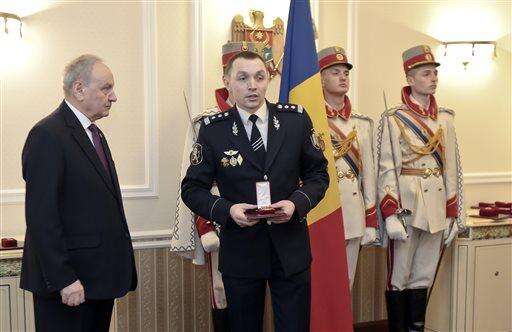
In this May 31, 2015 photo provided by Constantin Malic, former Moldova Police investigator Malic holds an award received from President Nicolae Timofti, left, in Chisinau, Moldova. Moldovan authorities, working with the U.S. FBI, have interrupted four deals involving gangs shopping radioactive material in the former Soviet republic, investigators tell The AP. The latest known case came in February 2015, when a smuggler offered radioactive cesium, specifically seeking an Islamic State buyer. (Courtesy Constantin Malic via AP)
The Associated Press
This undated photo provided by the Moldova General Police Inspectorate shows Alexandr Agheenco, a Russian citizen based in Moldova's breakaway region of Trans-Dniestr, and called "the Colonel" by his cohorts. Authorities said a 2011 uranium-235 smuggling operation was led by him with Teodor Chetrus, a former KGB informant, as his middleman. (Moldova Police via AP)
The Associated Press
This undated photo provided by the Moldova General Police Inspectorate shows Yosif Fiasal Ibrahim, a Sudanese doctor born in 1975. Ibrahim was identified by police as the potential buyer of one kilogram (2.2 pounds) of uranium-235 for which the sellers asked 32 million euros (USD $3.6 million), through middleman Teodor Chetrus in 2011. (Moldova Police via AP)
The Associated Press
In this Oct. 5, 2015 photo, an imported luxury SUV is parked outside the Cocos Prive club in Chisinau, Moldova. On the terrace of this exclusive dance club and sushi bar in February 2015, Valentin Grossu made his pitch to a client: 2.5 million euros (USD $2.8 million) for enough radioactive cesium to contaminate several city blocks. It was one of at least four attempts in five years in which criminal networks with suspected Russian ties sought to sell radioactive material to extremists through this former Soviet country. (AP Photo)
The Associated Press
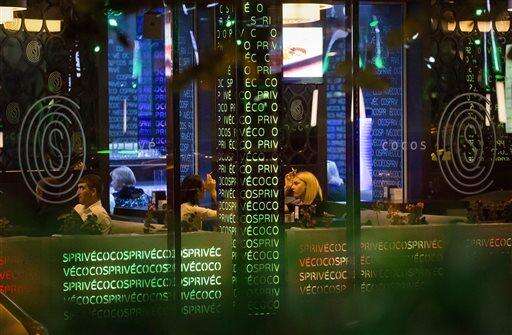
In this Oct. 5, 2015 photo, people sit in the Cocos Prive club in Chisinau, Moldova. On the terrace of this exclusive dance club and sushi bar in February 2015, Valentin Grossu made his pitch to a client: 2.5 million euros (USD $2.8 million) for enough radioactive cesium to contaminate several city blocks. It was one of at least four attempts in five years in which criminal networks with suspected Russian ties sought to sell radioactive material to extremists through this former Soviet country. (AP Photo)
The Associated Press
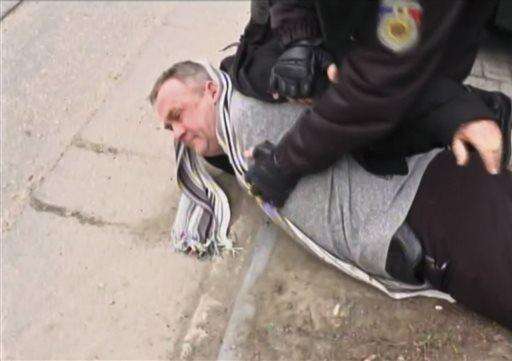
In this Feb. 19, 2015 image made from video provided by the Moldova General Police Inspectorate, a police officer arrests Valentin Grossu during a cesium smuggling sting operation in Chisinau, Moldova. During negotiations for the sale, Grossu warned that his cesium supplier was a retired Russian FSB officer with a reputation for brutality. If there was any trouble, "They will put all of us against the wall and shoot us," said Grossu, according to former Moldova Police investigator Constantin Malic. (Moldova Police via AP)
The Associated Press
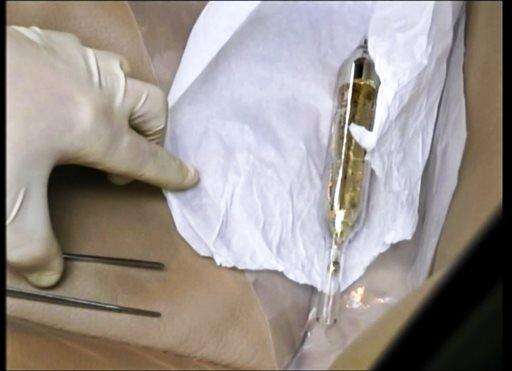
In this Feb. 19, 2015 image made from video provided by the Moldova General Police Inspectorate, an investigator looks at a vial containing cesium-135 on the driver's seat of Valentin Grossu's car following his arrest in Chisinau, Moldova. Former investigator Constantin Malic recalls, during negotiations for the sale, Grossu said his bosses wanted the cesium to reach the Islamic State. "They have the money and they will know what to do with it." (Moldova Police via AP)
The Associated Press
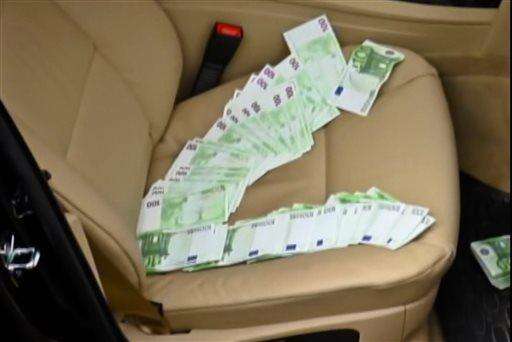
This Feb. 19, 2015 image made from video provided by the Moldova General Police Inspectorate shows Euro banknotes laid out on the passenger seat of Valentin Grossu's car following his arrest during a cesium smuggling sting operation in Chisinau, Moldova. During negotiations for the sale, Grossu warned that his cesium supplier was a retired Russian FSB officer with a reputation for brutality. If there was any trouble, "They will put all of us against the wall and shoot us," said Grossu, according to former Moldova Police investigator Constantin Malic. (Moldova Police via AP)
The Associated Press
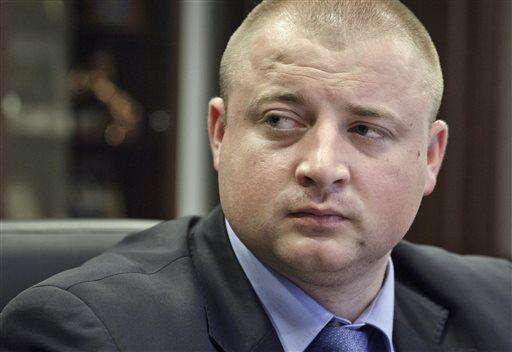
In this May 26, 2015 photo, Gheorghe Cavcaliuc, deputy of the Moldova General Police Inspectorate, pauses during an interview in Chisinau, Moldova. Referring to a 2011 uranium smuggling case, "Until the head of the criminal group is sentenced and jailed, until we know for sure where those substances seized in Europe came from and where they were going to, then we may be able to say a danger is still present," says Cavcaliuc, the senior police officer who oversaw the investigation. (AP Photo/Vadim Ghirda)
The Associated Press
In this May 28, 2015 photo, former Moldovan police investigator Constantin Malic holds an award received from the U.S. FBI in Chisinau, Moldova. By the time of the May 28 ceremony recognizing two recent investigations, the Moldovan police department had disbanded Malic's investigative team amid political fallout and police infighting. (AP Photo/Vadim Ghirda)
The Associated Press
In this May 28, 2015 photo, a police officer walks outside police headquarters in Chisinau, Moldova. Sign reads "Ministry of Internal Affairs, General Police Inspectorate." In the past five years, successful nuclear material smuggling sting operations in this former Soviet Republic were compromised by striking shortcomings: key suspects got away; prison sentences were surprisingly short; and gang leaders may have escaped with the bulk of their nuclear materials. (AP Photo/Vadim Ghirda)
The Associated Press
In this Thursday, May 28, 2015 photo, pedestrians walk past election posters for the Communist Party in Chisinau, the capital city of Moldova. Repeated attempts to sell radioactive materials signal that a thriving nuclear black market has emerged in this impoverished corner of Eastern Europe on the fringes of the former Soviet Union. (AP Photo/Vadim Ghirda)
The Associated Press
In this May 28, 2015 photo, graffiti is written on a Socialist Party electoral banner in Chisinau, Moldova. Eric Lund, spokesman for the U.S. State Department's bureau in charge of nonproliferation says, "Moldova has taken many important steps to strengthen its counter nuclear smuggling capabilities. The arrests made by Moldovan authorities in 2011 for the attempted smuggling of nuclear materials is a good example of how Moldova is doing its part." (AP Photo/Vadim Ghirda)
The Associated Press
This May 28, 2015 photo shows apartment blocks in Chisinau, Moldova. Repeated attempts to sell radioactive materials signal that a thriving nuclear black market has emerged in this impoverished corner of Eastern Europe on the fringes of the former Soviet Union. (AP Photo/Vadim Ghirda)
The Associated Press
This May 28, 2015 photo shows a wall of electoral banners for the Socialist Party in Chisinau, Moldova. Multiple Moldovan police and judicial authorities say a breakdown in cooperation between Russia and the West means that it is much harder to know whether smugglers are finding ways to move parts of Russia's vast store of radioactive materials. (AP Photo/Vadim Ghirda)
The Associated Press
In this May 28, 2015 photo, people play chess outdoors in Chisinau, Moldova. In the past five years, successful nuclear material smuggling sting operations in this former Soviet Republic were compromised by striking shortcomings: key suspects got away; prison sentences were surprisingly short; and gang leaders may have escaped with the bulk of their nuclear materials. (AP Photo/Vadim Ghirda)
The Associated Press